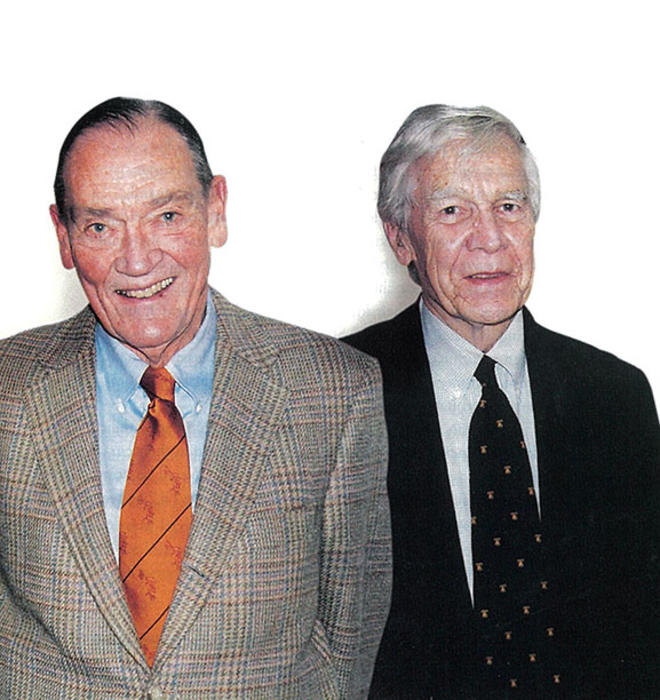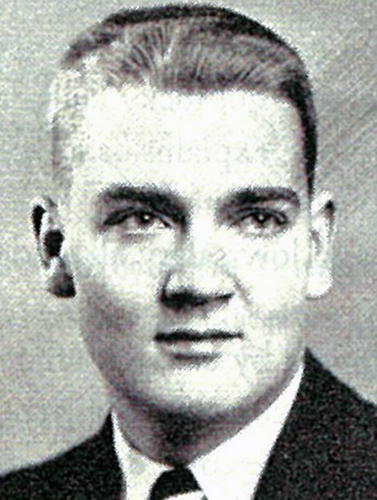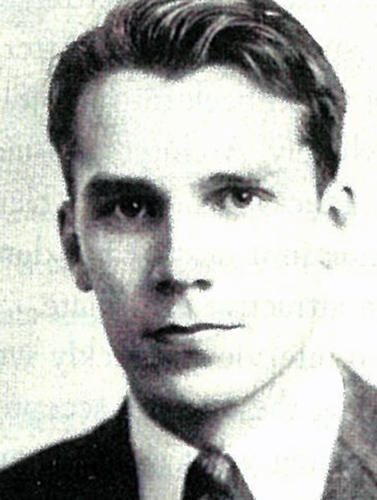
An Old Friendship, New Again
After half a century, Vanguard mutual fund founder John Bogle ’51 finds that his thesis adviser still has lessons to impart
John C. Bogle ’51, founder of the Vanguard Group, died Jan. 16, 2019, at age 89. He traced his vision of index investing back to a Princeton senior thesis about mutual funds, and in 2004, PAW wrote about Bogle’s effort to reconnect with his thesis adviser, Philip Bell ’46 *56. Bell died in 2007.
From the Feb. 25, 2004, issue of PAW.
John Bogle ’51 saw the light in December 1949. In a reading room at the new Firestone Library, the junior economics major paged through Fortune magazine, searching for a fresh, unexplored senior thesis topic. Sunlight streamed through the windows, illuminating an article called “Big money in Boston,” which profiled the Massachusetts Investors Trust and the “tiny but contentious” mutual fund industry. “It changed my life, that one little event,” Bogle says.
In the year that followed, Bogle researched investment companies, under the guidance of his adviser, Philip Bell ’46 *56, an instructor and Ph.D. student. The thesis proved immensely valuable for Bogle, opening the door to his first job and spawning a career in which he would create the Vanguard Group, the second-largest mutual fund company in the U.S. Bell also went on to a successful, but far less publicized, career in accounting and economics, and used his expertise in international economics to aid developing nations.
But Bell remained tucked away in Bogle’s mind, and 50 years later, Bogle tracked down his former adviser, who, it turned out, was living nearby. As the 74-year-old Bogle discovered, his former professor, now 79, still had stories to tell. The two men soon realized that their lives, like their addresses, were closer than expected. “We became two old friends,” Bogle says.
Philip Bell came to Princeton in the fall of 1942, but he left to join the Air Force before finishing his first year, earning his wings in the cockpit of a P-51 fighter. “Being 18 years old, and being anti-Japanese and anti-German, I’m afraid — I was not a Quaker as I am now — I was determined to do something,” Bell says. “They decided that I seemed to have some talent for teaching students how to fly.” Instead of heading abroad, Bell was selected to train cadets. On an air base in Arizona, he discovered a passion for teaching, and returned to Princeton to earn his A.B. in economics and later to pursue his Ph.D.
Bogle was a senior when he met Bell in 1950. Two years earlier, he had barely known the difference between stocks and bonds, and he almost lost his scholarship as he struggled through Paul Samuelson’s Economics: An Introductory Analysis. But Bogle soon grew confident, and he was determined to prove himself through his senior thesis. His topic posed challenges: At the time, mutual funds were rarely mentioned in textbooks, and overall industry figures were virtually nonexistent.The economics department was loaded with distinguished mentors: J. Douglas Brown ’19 *28, who helped design Social Security; Oskar Morgenstern, an early pioneer of game theory; and Jacob Viner, the renowned international economist. Bell, a Viner protégé, was paired with Bogle, who already had started researching what would be his 133-page treatise, The Economic Role of the Investment Company. In retrospect, Bogle calls his thesis “workmanlike, thorough, and loaded with idealism”; in addition to showing that mutual funds provide an advantageous investing option for middle-income investors and pension funds, it noted that investment companies, as valued as shareholders, could exert a positive influence on corporate policy. The thesis was well received, and Bogle graduated magna cum laude. Walter Morgan ’20, founder of the Wellington Management Company, a mutual fund company in Philadelphia, read the thesis and offered Bogle a job; by the mid-1960s, not long after his 35th birthday, Bogle was the heir apparent for Morgan’s C.E.O. post.
Bell lost track of Bogle after his graduation, but the young professor kept his teaching plans on track. During his doctoral studies, Bell coauthored The Theory of Measurement and Business Income, eventually published in 1961; it was a hot work in accounting circles, and Bell eventually was inducted into the Accounting Hall of Fame at Ohio State University. After serving as a research associate for international relations expert George F. Kennan ’25 and teaching briefly at Haverford College, Bell joined the faculty at the University of California, Berkeley, in the late 1950s. But his opinion of research institutions soured. “I got used to professors saying, ‘This would be a great place, if only there weren’t any students,’” Bell recalls. “And I happen to like students.” He returned to Haverford.In 1963, Bell’s love of teaching led him to Uganda, where he headed the economics department at Makerere University. Dismayed by a curriculum that stressed irrelevant lessons such as manipulating bank rates in London, Bell revamped the department, writing new textbooks, teaching international economics, and sending the best and brightest pupils abroad for graduate school. He returned to the U.S. three years later, but kept in touch with his students and colleagues. Bell looked on helplessly as dictator Idi Amin’s regime “killed every student that I had gotten educated abroad and brought back,” he says. Convinced that it was not safe to return to Uganda, Bell taught in Kenya and Malaysia during the 1970s.
For one event, Bogle dusted off his senior thesis, looking for a bit of historical perspective. There, he found a tiny seed for that first index fund, planted more than two decades before its inception: “Mutual funds can make no claim to superiority to the market averages.”
While Bell made his mark, Bogle faced difficult times. After a market downturn, he was voted out as Wellington’s C.E.O. in 1974, though he retained his post on the fund board. Like Bell, Bogle kept sight of his values while building a career. He pitched the idea of an independent fund company that acted purely in the interests of its shareholders, reminiscent of the 21-year-old undergraduate’s view of the investment company. There would be no-load fees and minimal management costs. The investors assume the risk, he reasoned, and they should reap the rewards. The board narrowly approved Bogle’s plan for the new firm, which he named Vanguard, after the ship that led the British Navy into battle against Napoleon.
One of Bogle’s early creations was the industry’s first index fund, which allowed investors to spread their investment evenly over a wide range of stocks. The idea initially drew a lukewarm response from investors discontented by merely earning returns that mirrored the market average. But clients eventually bought into Bogle’s ideas, and his funds. From 1974 to 2003, Vanguard’s assets under management grew from just more than $1 billion to $665 billion, and the Vanguard 500, Bogle’s original index fund, became the largest mutual fund in the world.
By the mid-1980s, Bogle was at the top of the investment industry, and with his success came awards and invitations to make speeches. For one event, Bogle dusted off his senior thesis, looking for a bit of historical perspective. There, he found a tiny seed for that first index fund, planted more than two decades before its inception: “Mutual funds can make no claim to superiority to the market averages.” In other words, the most reliable investment in the market is the market itself.
Bogle also noticed the acknowledgment of Bell’s “excellent and greatly appreciated efforts to assist in removing basic errors and to steer the author along the proper course,” and in 1999, he set out to find his adviser, a project that lasted four years. After traveling the world, Bell had retired to Kennett Square, Pennsylvania, a half-hour south of Vanguard’s headquarters. A few months after writing to his former adviser, Bogle received a letter back, written in an apologetic tone. Bell had been recuperating from back surgery, but he was eager to talk with Bogle.
The meeting took place one early morning in September. “I looked at him and he looked at me, kind of quixotically,” Bogle recalls, “and I said ‘We’ve both aged.’” The two men reminisced and reported milestones from the past 50 years. They exchanged signed copies of books they had written. Two hours passed before they shook hands and said goodbye, and a few weeks later, the two new, old friends met again. In the last few months, they have kept in contact, exchanging cards and letters.
Bogle retired as Vanguard C.E.O. in 1999 but shows few signs of slowing down. Now the president of the Bogle Financial Markets Research Center, he still makes speeches and writes occasional op-eds. His office is packed with books and papers, and his phone keeps ringing. As an affable idealist in an industry desperate to earn back public trust, Bogle has become “human Velcro,” according to Morgan Stanley analyst Steve Galbraith, who says members of Congress latched on to Bogle’s words when he testified in Washington last year. The young man who struggled through Samuelson’s economics text has now published a book, Bogle on Mutual Funds, with a foreword written by Samuelson. Fortune, publisher of the article that inspired his thesis, named Bogle one of the investment industry’s four “Giants of the 20th Century.”
Like Bogle, Bell has an office filled with stacks of papers and books. He organizes newspaper clippings in trays by subject — general economic theory, international economics, Federal Reserve policy — and although he’s been retired for nearly a decade, he seems ready to teach a full course load at a moment’s notice. His shelves hold his Freshman Herald and his class’s 50th reunion book, The Best Old Place of All. On the walls are reminders of memorable times, including a picture of the distinguished Princeton economics faculty of 1950-51 and a Ugandan mosaic of banana bark. A Quaker and a pacifist, Bell says, “To this day, I believe very strongly in doing everything we can for the underdeveloped world.”
Bell’s desire to make a difference is not lost on Bogle, an investment “activist” who sees vast room for ethical improvement. “You have to admire someone with his sense of values,” Bogle says. “You don’t run into enough good people in this life.” Not twice in a lifetime, at least.








No responses yet